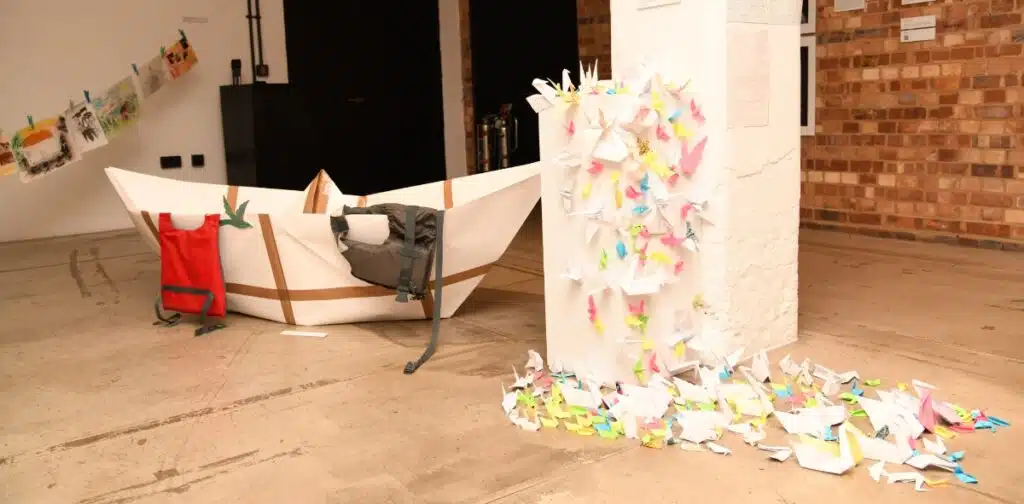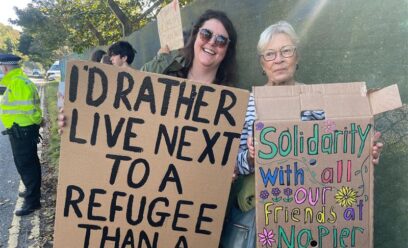How IMIX began to humanise the toxic debate about Channel crossings
Posted by Katherine Maxwell-Rose on March 4, 2024
As recently as 2018, less than 300 people crossed by small boat. These numbers soared after 2020, with 45,755 people crossing this way in 2023 alone. Although historically thousands of people have crossed from Northern France to England by lorry, the images of dinghies arriving on UK shores ensured the subject dominated news headlines from 2021 onwards.
While these headlines were in many cases event-driven, the issue also initially proved to be a tempting opportunity for Home Secretaries to position themselves as hardline on immigration, spawning headlines such as ‘Armoured jet-skis to be used by Border Force’ despite such policies never coming to fruition. The less-clickbaity reality is that Channel crossings take place for a complex range of reasons, including geopolitics, the UK’s arrangements with its nearest neighbours, a lack of safe alternative routes, the increased surveillance of lorries, and of course the fundamental fact that an individual must be on UK soil to claim asylum.
Ultimately, those most affected by Channel crossings are the individuals who feel unsafe enough to get into a dinghy and risk their life at sea. However, the media debate rarely included their voices. This was in part due to the challenge of finding someone with lived experience who could speak English, was willing and able to revisit a traumatic subject, and felt secure enough to talk to a journalist. It was not helped by the lack of awareness among journalists, with even some seasoned correspondents seemingly unable to understand why an asylum seeker might need to be kept anonymous when talking about one of the most polarising policy areas in the UK today.
IMIX has actively sought out those experts by experience who do wish to speak and created opportunities that allow them to do so on their terms. For example, a digital project, ‘Museum of Calais’, allowed individuals to share their stories anonymously using images of the objects they brought with them, and was later featured by Kent Live. IMIX also provided interpreters where needed, hosted off-the-record briefings so that experts by experience could speak freely, and supported former refugees to share stories of their life in the UK, and the reasons they were forced to make irregular journeys in the past.
IMIX has helped arrange interviews with experts by experience for BBC Newsnight, Sky News and ITV, as well as The Metro, PA News, The Times and many other news outlets. We have also advised on a Channel Four drama which featured a Syrian teen who crossed irregularly to the UK.
The South Coast of England is disproportionately affected by media coverage of Channel Crossings. Therefore, IMIX has also provided bespoke media training to Kent-based organisations as well as serving as a back-up press office for local charities at times of crisis. While the subject continues to dominate headlines, the March 2024 British Immigration Future Tracker found that roughly half of the population continues to empathise with those crossing the Channel, suggesting that the campaign against dehumanisation has at least partially worked.
Shaping more humanising coverage of channel crossings: an IMIX media briefing
In late November 2023, IMIX held a press briefing for journalists to understand the reality of channel crossings from the perspective of frontline workers and people with lived experience. The impetus for the briefing was anticipated coverage of channel crossings in the run up to the tragic anniversary of 31 people who died crossing the Channel in 2021.
Seeking to shape more humanising, informed, and compassionate coverage of channel crossings, the IMIX team used its networks to bring together a panel of people with lived experience, frontline workers, and policy experts for the briefing. In preparation for the briefing, which was held online, team members conducted one-to-one meetings with the speakers to ensure they were adequately prepared, informed and emotionally supported to speak to journalists.
Speakers included an Iranian man who crossed the Channel in 2022, the bereaved family of a man who drowned in the 2021 disaster, and a worker supporting sanctuary seekers on the frontlines at Calais. As an extra safeguarding precaution, the event was initially kept off the record. Journalists were able to follow up with IMIX staff for direct quotes and interviews after the initial event. This approach was intended to instruct journalistic practice, illustrating the importance of building a base of trust and support when working with people with traumatic lived experiences.
Journalists were present from a range of papers and newswires, including Press Association, the New Statesman, the National, i news, the Independent, the BBC, the Bureau of Investigative Journalists, as well as several freelancers. There were a range of requests to interview the briefing participants. This resulted in a regional and national media coverage which centred on-the-ground lived experiences of crossing the Channel, as well as deepened relationships with a range of journalists.



